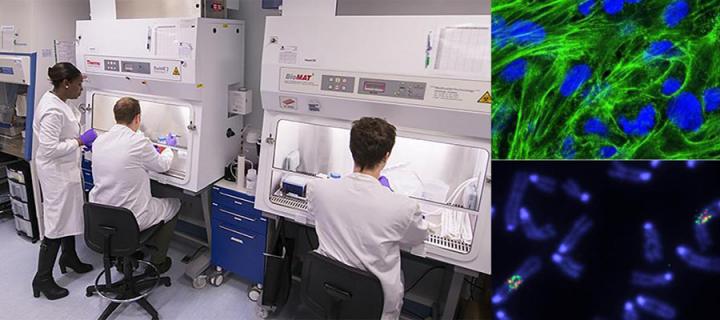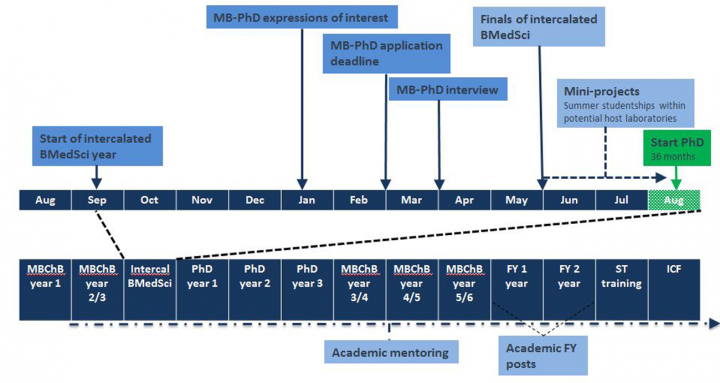TRACC Programme MB-PhD
PhD opportunities for MB-ChB students.
Launched in 2019-2020, the Cancer Research UK-funded TRACC MB-PhD scheme offers a new and exciting opportunity for bright, motivated and enthusiastic medical students to gain top quality research training as well as securing clinical qualification. The scheme is designed not only to offer PhD training integrated in a clinical medical degree, but also, critically, to maximise retention of participants within medical research. It is envisioned that Programme alumni will become the academic clinical leaders in cancer research in the future. Selected applicants will be trained in cutting edge practical scientific and analytic skills with a focus on scientific excellence, while gaining in-depth understanding of the rigour, discipline and precision required for translational research. The outcomes of the students’ research are expected to be published in high profile medical/scientific journals. Many projects will focus directly on aspects of cancer pathogenesis or treatment, while others may focus on acquiring high level skills that are applicable to important questions in cancer research in the longer term.

The TRACC/TRACC+ Programme MB-PhD scheme is recruiting now! (application deadline extended till 16 April)
For details please download the power point or pdf file below:
Watch the TRACC Programme MB-PhD Information Session Recording (2019)
Course Summary
The TRACC MB-PhD programme enables 3rd-year MB-ChB students to enter a 3-year PhD training at the end of their intercalated year before re-integration into the MB-ChB course (see schematic below). Close mentorship by MB-PhD leaders will be a feature of the programme, right from the PhD selection process, through the PhD project, to MB-ChB course completion and beyond in the postgraduate phase, to maximise the chance of sustained academic career success. PhD research is undertaken within groups and centres/institutes associated with College of Medicine & Veterinary Medicine in Edinburgh or the College of Medical, Veterinary & Life Sciences in Glasgow (for more details see the Research Training Environment Section). Special emphasis is placed on cross-city interactions, which will include collaborative projects in some cases, joint symposia and multiple other activities bringing together MB-PhD students, clinical research fellows and other researchers/clinicians from both cities. As well as benefiting from the vibrant cancer research community across Edinburgh and Glasgow, MB-PhD students will additionally be encouraged to network with MB-PhD students in other UK centres.

Eligibility
The TRACC MB-PhD programme is available to students who are currently undertaking an intercalated medical degree (MB-ChB) at the University of Edinburgh or the University of Glasgow. External candidates can be considered only in exceptional circumstances and should consult with the Programme administrator before applying. Particular attention will be paid during the selection process to prior experience of scientific research (e.g. from intercalated degrees and summer research studentships).
2024 Entry in Edinburgh
MB-PhD Expression of Interest: expressions of interest should be send by e-mail to traccadminedinburgh@mlist.is.ed.ac.uk
Application closing date: 16 April 2024
Expected interview date: 7 May 2024
Start of (optional) summer mini-projects: June 2024
Start of the PhD project: August 2024 (subject to potential adjustments)
The key dates for 2025 entry will be advertised here in due course.
Applying
To apply for an MB-PhD position in Edinburgh please submit your completed TRACC Programme MB-PhD Application form and accompanying documents (CV, References) to the traccadminedinburgh@mlist.is.ed.ac.uk e-mail address before the application deadline.
Dawnload the Application Form for the TRACC Programme MB-PhD Position:
Informal enquires can be addressed to the following key contacts:
| Dr Farhat Din | Farhat.Din@ed.ac.uk |
| Prof Charlie Gourley | charlie.gourley@ed.ac.uk |
| Prof Robert Semple | rsemple@ed.ac.uk |
| Dr Stefan Symeonides | stefan.symeonides@ed.ac.uk |


